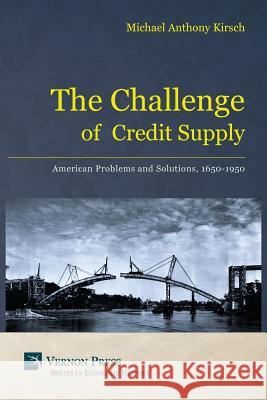The Challenge of Credit Supply: American Problems and Solutions, 1650-1950 » książka
The Challenge of Credit Supply: American Problems and Solutions, 1650-1950
ISBN-13: 9781622730766 / Angielski / Miękka / 2016 / 276 str.
This book is for anyone seeking a succinct and accessible treatment of the most pivotal financial and monetary policies throughout American history from 1650-1950. But it is especially written for those who desire an intricate and detailed knowledge of how and why these policies worked with respect to the supply of adequate credit for economic development. A thorough examination of key credit institutions and their specific powers, functions, mechanisms, context, and economic impact brings the reader to a recognition of which policies and institutions were successful and unsuccessful in supporting the economy and preventing crisis. Its extensive use of primary sources, period literature, and carefully chosen quotations allows the reader to participate in the original discussion and issues that faced Americans in each era. This vivid account leads to a unique grasp of relationships between essential facts, ideas, and time periods. The reader is rewarded with the rare experience of seeing the evolution of three hundred years of policy development as an integrated process. The book's content will be new and provoking to the academic, policy maker, and economist, but is presented in a manner and style ensuring comprehension for a general audience and those new to the topics involved. Many of the lessons learned in the course of the investigation are relevant and applicable to modern economic and financial policies.
This book is for anyone seeking a succinct and accessible treatment of the most pivotal financial and monetary policies throughout American history from 1650-1950. But it is especially written for those who desire an intricate and detailed knowledge of how and why these policies worked with respect to the supply of adequate credit for economic development. A thorough examination of key credit institutions and their specific powers, functions, mechanisms, context, and economic impact brings the reader to a recognition of which policies and institutions were successful and unsuccessful in supporting the economy and preventing crisis. Its extensive use of primary sources, period literature, and carefully chosen quotations allows the reader to participate in the original discussion and issues that faced Americans in each era. This vivid account leads to a unique grasp of relationships between essential facts, ideas, and time periods. The reader is rewarded with the rare experience of seeing the evolution of three hundred years of policy development as an integrated process. The book’s content will be new and provoking to the academic, policy maker, and economist, but is presented in a manner and style ensuring comprehension for a general audience and those new to the topics involved. Many of the lessons learned in the course of the investigation are relevant and applicable to modern economic and financial policies.











